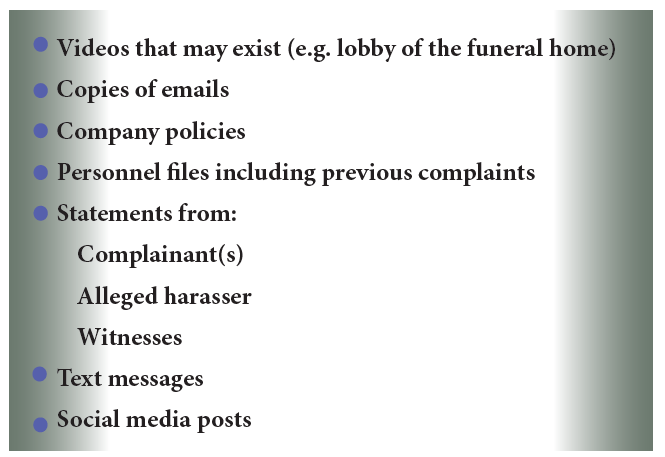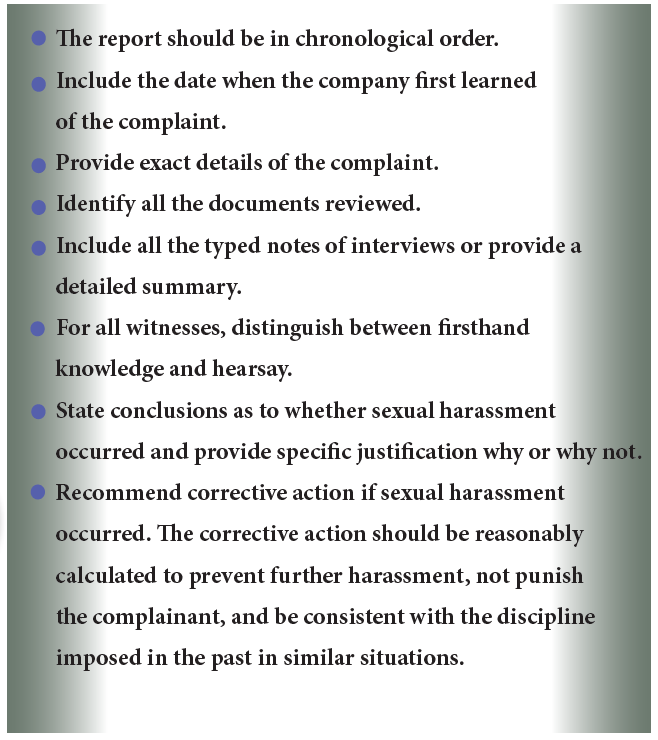Sexual harassment in the workplace continues to be a trending topic in the United States. While many would like to believe that harassment is not taking place in the funeral industry, in fact, this industry has not escaped these incidents. Various lawsuits have been filed against family-owned and international funeral businesses.
Many funeral businesses understand the need to have anti- harassment policies as well as formal procedures in place for employees to report any harassment. Most anticipate they are never likely to receive such a report. However, the reality is that any funeral business may receive a complaint from an employee about experiencing sexual harassment while working.
Frequently, such complaints catch owners and managers completely off guard, and they stumble when they attempt to deal with the situation. This may put them at greater risk for a costly lawsuit. So how does a funeral owner or manager handle a complaint of sexual harassment?
How a business handles a sexual harassment complaint can have a significant impact on the outcome. Take for example the Massachusetts case of Emma Gyulakian versus Lexus of Watertown, Inc. filed in January 2013. The original jury rendered a verdict in favor of the plaintiff, Emma, finding that defendants were liable for $40,000 in compensatory damages and $500,000 in punitive damages. After multiple appeals by the defendants, in August 2016, the state’s high court affirmed the jury’s award. This decision appears to be based on two key factors:
- Despite notification by Emma of her supervisor’s (the alleged harasser) behavior, his manager simply didn’t believe her and did not take any action. In fact, she complained multiple times and no action was taken.
- After Emma was terminated, she once again stated she had been harassed, and an investigation was conducted. Both the jury and the judges indicated that the investigation was essentially a sham
This case provides a valuable lesson for all employers regardless of industry; 1) investigate every complaint and 2) have a formal and well-crafted investigative process.
It is important to realize upfront that investigating sexual harassment complaints is not easy. It tends to be an embarrassing situation for all parties involved or questioned. Not only are the employees involved in the investigation going to be uneasy, but the individual responsible for undertaking the investigation may be sensitive to how the outcome of the investigation may impact their relationship with employees or management. To facilitate this difficult process, funeral home owners/managers can follow several key steps:
1. Have an Investigative Plan
An investigative plan is a document that outlines the objective of the investigation and the process to be followed. One of the most important aspects of any investigation is that it be deemed a credible process. To accomplish that goal, create an investigative plan that can be used for any investigation whether for a complaint of harassment, theft, or any other. The plan should include items such as:

The investigative plan should be kept in a folder with all other documents related to the investigation. This can serve as a guide and checklist for the investigator as they proceed through the investigation.
2. Gather Evidence
Clearly, the objective of the investigation will determine what type of evidence needs to be gathered to prove or disprove the complaint. Evidence should include any medium that conveys information about what occurred during the event(s) in question. Some examples are:

3. Prepare for Interviews
It is beneficial for the investigator to prepare a series of questions prior to beginning any interview. The goal of the interview questions is to give the investigator enough detail to
clearly understand the actual events that took place.Based on the Equal Employment Opportunity Commission (EEOC) Notice 915.002 dated June 18, 1999, some of the questions that should be asked when addressing sexual harassment complaints include:
Complainant
- Who committed the alleged harassment?
- What exactly occurred or was said?
- When did it occur and is it still ongoing?
- Where did it occur?
- How often did it occur?
- How did it affect you?
- How did you react?
- What response did you make when the incident(s) occurred or afterwards?
- Has your job been affected in any way?
- Are there any persons who have relevant information? Was anyone present when the alleged harassment occurred? Did you tell anyone about it? Did anyone see you immediately after episodes of alleged harassment?
- Did the person who harassed you harass anyone else? Do you know whether anyone complained about harassment by that person?
- Are there any notes, physical evidence, or other documentation regarding the incident(s)?
- How would you like to see the situation resolved?
- Do you know of any other relevant information?
Alleged Harasser
- What is your response to the allegations?
- If the harasser claims that the allegations are false, ask why the complainant might
- Are there any persons who have relevant information?
- Are there any notes, physical evidence, or other documentation regarding the incident(s)?
- Do you know of any other relevant information?
Witnesses
- What did you see or hear? When did this occur? Describe the alleged harasser’s behavior toward the complainant and toward others in the
- What did the complainant tell you? When did they tell you this?
- Do you know of any other relevant information?
- Are there other persons who have relevant information?
4. Conduct Interviews
The investigator must endeavor to maintain the highest level of confidentiality. However, it is impossible to maintain complete confidentiality while conducting the investigation as it is necessary to complete interviews that require the exchange of questions and responses with those who may have knowledge of the events. The investigator must convey to all parties that confidentiality is vital and failure to maintain confidentiality could have repercussions. Just as employees are required to maintain the confidentiality of the families the funeral business serves, so should they maintain confidentiality regarding the investigation. Interviews begin with the complainant then the alleged harasser. The actual interviews should be conducted privately with the investigator(s) and each interviewee individually. The pre-established interview questions should be asked as well as any follow up questions to gain clarity of the circumstances of the events.
After the first two interviews, the investigator should proceed with interviewing any identified witnesses. When interviewing the witnesses, the investigator should attempt to elicit the name of the complainant and alleged harasser at the beginning of the interview rather than simply providing the information themselves. It is critical that the investigator determine whether the witnesses have firsthand or secondhand knowledge of the situation. The investigator should keep detailed notes during the interviews. These notes can then be typed for clarity and ease of review following the interview.
5. Retain all Documentation
Create a master investigative file that incorporates all data collected during the investigation. This should include the investigative plan, interview questions, interview notes both handwritten and typed, all evidence gathered, and any witness statements. Also, document why any specific witnesses were not interviewed and if certain evidence was not made available to you. It is important to remember that all this data may ultimately be reviewed during a court proceeding. This is the funeral business’s record of what steps were taken during the investigation and what information was reviewed.
6. Reach a Conclusion
Inherent plausibility: Is the testimony believable on its face? Does it make sense?As part of making a final determination about the complaint, the investigator must assess the credibility of everyone interviewed as well as untangling any discrepancies identified during the investigation. The EEOC offers some guidelines (in the same notice mentioned earlier) to consider when establishing credibility and resolving discrepancies:
Demeanor: Did the person seem to be telling the truth or lying?
Motive to falsify: Did the person have a reason to lie?
Corroboration: Is there witness testimony (such as testimony by eye-witnesses, people who saw the person soon after the alleged incidents, or people who discussed the incidents with him or her at around the time that they occurred) or physical evidence (such as written documentation) that corroborates the party’s testimony?
Past record: Did the alleged harasser have a history of similar behavior in the past?
Once all the evidence is gathered and reviewed, all the credibility issues are resolved, and a determination is made between “unwelcome” and “voluntary” sexual conduct, the investigator must conclude if a company policy was violated or if inappropriate conduct occurred, and recommend a course of action to management.
7. Write a Final Report
The last step in the investigative process for the funeral service business is the creation of a final report. The investigator should create a thorough and impartial report. Keep these standards in mind when formatting an investigative report:

While the final report concludes the investigation, it is not the final resolution to the complaint. Once the funeral home owner/manager has the report in hand, they should review it carefully to determine if there are any deficiencies in the investigation or in the report. They should ask any follow- up questions as well as conduct any interviews themselves if necessary.It is critical that funeral owner/manager’s document their actions once they have the report. Clearly the investigator should have made a recommendation of corrective action if appropriate, but it is in the hands of the funeral home owner/manager to implement and enforce any corrective action.
The EEOC has an expectation that the employer will take immediate and appropriate action if there has been a violation of the employer’s policies and that management should inform both parties of these actions. Funeral home employers should consider the EEOC’s expectation in deciding what disciplinary measures to apply to the situation as they can be found liable in the future if the harassment continues. Currently the best recommendation is that any disciplinary measures should be proportional to the seriousness of the offense committed.
In Conclusion
While this process may appear to be complicated and intense, the reality is that it is better to be prepared with how to investigate than to face a complaint of sexual harassment and either not investigate or conduct a poor investigation. If you decide you cannot investigate “in-house”, seek professional assistance.